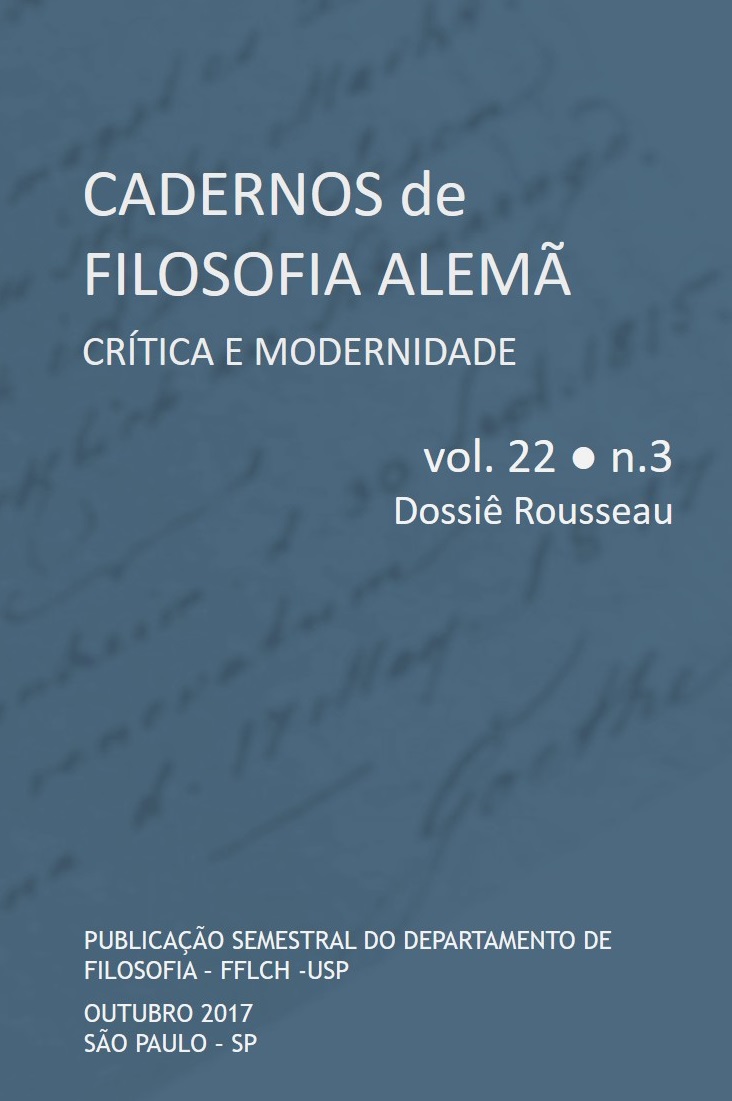A história filosófica contra Rousseau
DOI:
https://doi.org/10.11606/issn.2318-9800.v22i3p91-106Palabras clave:
history, conjecture, savage, eloquenceResumen
Trata-se de mostrar como a história filosófica, gênero típico da época da Ilustração, foi utilizada como uma espécie de método alternativo à história conjectural, tal como concebida e utilizada por Rousseau no segundo Discurso. É o caso, notadamente, da History of America, do escocês William Roberston, onde o selvagem americano aparece como tipo do homem natural, inserido no quadro de uma teoria do desenvolvimento da sociedade através de estágios. A profundidade teórica e o potencial crítico da obra de Robertson foram identificados por Edmund Burke, seu primeiro e mais arguto leitor.Descargas
Referencias
Buarque de Holanda, S. (1974). “’Prefácio’ a Maria Odila da Silva Dias”. In: O fardo do homem branco. São Paulo: Companhia Editora Nacional (Brasiliana).
Buffon, G-L. (2008). «Des époques de la nature». In: S. Schmitt (ed.). Oeuvres de Buffon. Gallimard/Pléiade.
Burke, E. (1759). “An account of the books for the year 1759”. In: Annual register for the year 1759. Eighteenth Century collections on line.
____________. (1762). “An account of the books for the year 1762”. In: Annual register for the year 1762. Eighteenth Century collections on line.
____________. (1958). The correspondence of Edmund Burke, vol. I. T. W. Copeland (ed.). Cambridge: Cambridge University Press.
____________. (1961). The correspondence of Edmund Burke, vol. III. George Guttridge (ed.). Cambridge: Cambridge University Press.
____________. (1990). Philosophical inquiry into the original of our ideas of the sublime and the beautiful. Adam Phillips (ed.). Oxford: Oxford University Press.
____________. (1993). Reflections on the revolution in France. L. G. Mitchell (ed.). Oxford: Oxford University Press.
____________. (2008). An abridgement of English history. New York: Cosimo Classics.
____________. (2009). Pre-revolutionary writings. Ian Harris (ed.). Cambridge: Cambridge University Press.
____________. (2012). Lettre à un member de l’assemblée nationale sur la revolution française et Rousseau. Patrick Thierry (ed.). Paris: Mille et une Nuits.
Cícero. (2008). The republic and the laws. Translated by Niall Rudd. Oxford: Oxford University Press.
Foucault, M. (1966). Les mots et les choses. Une archéologie des sciences humaines. Paris: Gallimard.
Gibbon, E. (2014). Ensaios de história. Tradução de P. P. Pimenta. São Paulo: Iluminuras.
Hargraves, N. (2002). The progress of ambition. Character, narrative and philosophy in the works of William Robertson. Journal of the history of ideas, 63(2), pp.261-282.
Hume, D. (1983). The history of England from the invasion of Julius Caesar to the Revolution. 6 vols. William B. Todd (ed.). Indianapolis: Liberty Fund.
____________. (1985). Essays, moral, political, and literary. E. F. Miller (ed.). Indianapolis: Liberty Fund.
____________. (1978). Philosophical essays concerning human understanding, ed. fac-símile. Hildesheim/Nova York: Olms Verlag.
Locke, J. (1978). An essay concerning human understanding. P. H. Nidditch (ed.). Oxford: Clarendon Press.
Monteiro, D. L. (2012). Anarquia e Conformação das Coisas: algumas observações sobre revolução, história e linguagem em Edmund Burke. Dois Pontos 8(1), pp.11-22.
Pimenta, P. P. (2012). “O filósofo no espelho. Hume, Rousseau e d’Alembert”. In: A imaginação crítica. Hume no Século das Luzes. Rio de Janeiro: Azougue.
Pococok, J. G. (2001). A. Barbarism and religion vol. 2. Narratives of civil government. Cambridge: Cambridge University Press.
Prado Jr., B. (2008). A retórica de Rousseau. São Paulo: CosacNaify.
Robertson, W. (1762). “A view of the progress of society”. In: The history of Charles V (1762). Eighteenth Century Collections online.
____________. (1977). The history of America (1777). Eighteenth Century Collections online.
Rousseau, J. J. (1981). Discours sur l’origine et les fondements de l’inegalité parmi les hommes. Braunstein (ed.). Paris: Nathan.
____________. (1993). Essai sur l’origine des langues. Catherine Kintzler (ed.). Paris: Flammarion.
Stewart, D. (1802). Account of William Robertson. In: The works of William Robertson. 2a ed. Londres.
Whiters, C. J. (2007). Placing the Enlightenment: thinking geographically about the age of reason. Chicago: University of Chicago Press.
Descargas
Publicado
Número
Sección
Licencia
As informações e conceitos emitidos em textos são de absoluta responsabilidade de seus autores.
Todos os artigos anteriores a 5 de julho de 2018 e posteriores a julho de 2021 estão licenciados sob uma licença CC BY-NC-ND, exceto os publicados entre as datas mencionadas, que estão sob a licença CC BY-NC-SA. A permissão para tradução por terceiros do material publicado sob a licença CC BY-NC-ND poderá ser obtida com o consentimento do autor ou autora.
Políticas de acesso aberto - Diadorim


